Note from Jane: Today’s guest post is from Dan Blank (@DanBlank) and covers a topic that was recently addressed on this site by L.L. Barkat: the value of blogging. If you remember, Barkat advised writers to stop blogging. For the other side of the story, I’ve asked Dan to offer reasons to keep blogging.
In the past few years, social media has eclipsed blogging in terms of where many writers spend their time when online. Many now choose to tweet, post to Facebook, or review on Goodreads instead of blogging on their own website.
While social media delivers a potentially more immediate reaction from others, I am still a big believer in blogging. There are many reasons for this, but let’s just focus on two specific reasons. Then we’ll discuss how to deal with blogging exhaustion—or when to kill a blog entirely.
1. The long-term value of developing a body of work.
Yes, a blog becomes a body of work in and of itself. Just as with a journal, you and others can look back at what you have created over time. How does this differ from social media? Let’s look at an example.
Let’s say that you follow me on Twitter and connect with me on Facebook, and you remember that a while back, I shared a link to which podcasting equipment I recommend people buy—and you want to start a podcast for your readers.
Go ahead, try to find the link I shared on Twitter. You can’t. Twitter delivers zero tweets when you search on my name and the word “podcasting.” All it can do is recommend that you follow two people—me and some other guy:
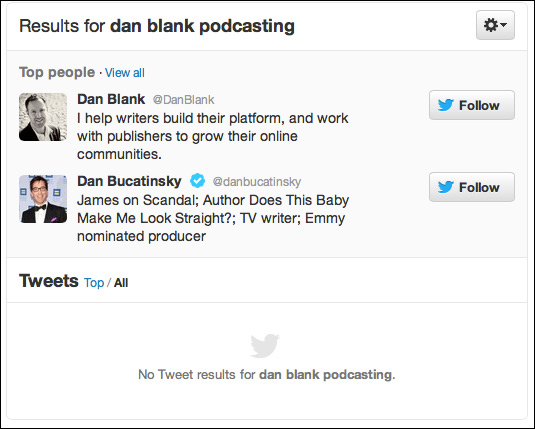
Even if you try scrolling back through my 18,000+ Tweets, it isn’t long before Twitter simply stops you. You can’t dig into the full archive.
Let’s try that on Facebook:
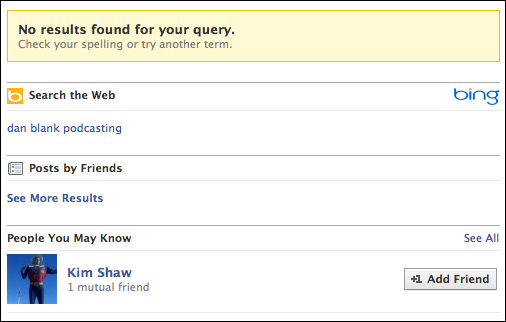
The results aren’t any better on Facebook. Now, let’s try a basic Google search:
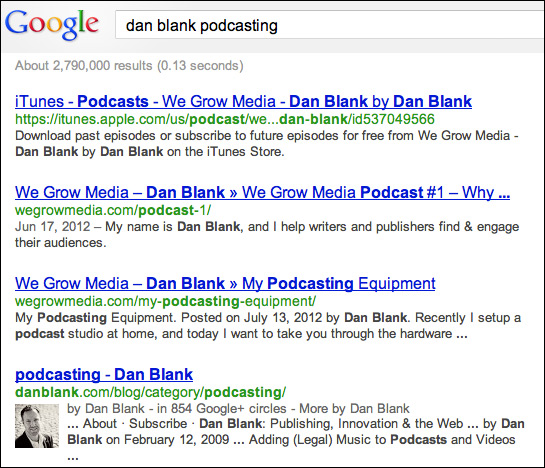
The result I am looking for is the third result on the page, along with other relevant results not just on who I am, but everything associated with me and the term “podcasting.”
Social media is amazing in the moment, but eventually disappears into a black hole. Blogging, like books, have a very long shelf life, and become more findable over time, not less.
2. When you blog, you get to control the message.
Were you comfortable when Amazon bought Goodreads? When Facebook decided to change how you can use their social network? When you learned of Pinterest’s terms of service of pinning your own photos?
While these services ARE valuable, and you should use them, why give them 100% control over your message, how people find you, and what you can and can’t do? For example, author Allison Winn Scotch has been blogging for years, and in doing so, built up findability on Google. When you search her name, this is what you see:
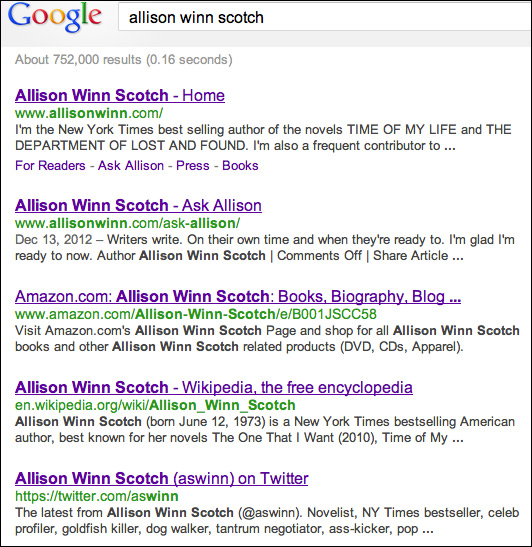
Yes, links to large websites such as Amazon, Wikipedia, and Twitter appear near the topic, but the first two links go directly to Allison’s own website, where she 100% controls the message. Regardless of what changes with Twitter or Amazon, Allison is findable on her own terms.
Blogging Exhaustion: Are You Running Out of Things to Say?
When Jane and I recently discussed blogging, she mentioned to me that some bloggers are facing “blogging exhaustion” and are running out of things to say.
I have a lot of empathy for writers facing this situation, because there is an unending list of things writers could be doing at any given moment. For the blogger who is feeling exhausted, consider the source of this. In that moment where you say, “Maybe we should see other people,” is it because of deep problems with your relationship to blogging, or simply that you need to reenergize it?
Be wary of jumping from a blog to the social media flavor of the week. It can be exciting to try something new, but it can also be a false promise. For example, if you find it a long, slow slog to grow readers on a blog or on Twitter, and hope that if you join Tumblr or Pinterest, that you will find immediate success …
That. Won’t. Happen.
Your motivation is—even more than time management—your greatest resource. If you are feeling demotivated, consider the following ways to keep the fire burning:
- Be honest. Too many people take long lapses in their blog, only to feel guilty about it. Like any relationship, communication is critical. If you are experiencing doubts about the value of your blog, post some entries exploring this. In other words: work through it. But also: give your audience a chance to speak up and yell, “Hi! We are here and like you! This is why we would love for you to keep blogging.”
- Bring in other voices. Sometimes it can be lonely to be the sole keeper of a blog. Find ways to involve others. Interview people who inspire you, collaborate on guest posts, or even post blog entries elsewhere. I found that when I approach writing a blog for someone such as Jane, or even a post for Huffington Post Books, I approach it wildly differently than on my own blog. It gets the juices flowing in a different way.
- Mindmap it out. Consider what you blog about and how the dozens or hundreds of disparate posts work together. Find new threads for topics you want to write about.
- Create an editorial calendar. Sometimes a little bit of structure can remove the anxiety of blogging. Consider how often you want to post, create different types of content, and begin filling out topic ideas weeks or months in advance.
- Identify core messages versus secondary messages. Oftentimes, a blogger may stray from writing about that which matters most to them. Consider the key evergreen messages you want to hit again and again, and how you can explore them in new ways.
- Repackage ideas into series. Instead of creating many one-off blog posts, create a series of five or ten posts that work together.
- Try different types of media. Instead of writing a post, create a video and embed it. Or tell a story with photos. Find other ways to express the same ideas.
- You do not need to post every day. I tend to feel that once per week is a nice posting frequency. That said, there are plenty of bloggers who post less frequently, but whose blog posts really stand out. Author Tim Ferriss tends to only blog when he feels he has something compelling to share. If you look at his archives, you find very little consistency in terms of frequency, but every post gets tons of comments.
- Create templates for posts that you can fill in. Or brainstorm a laundry list of post ideas and headlines in one caffeine-fueled session per month.
- Focus on unique value—often it is closer than you think. Instead of creating a master post on “5 ways authors can use Pinterest for explosive audience growth,” share a story from your life. Be honest with readers instead of trying to impress them. Oftentimes this is when people become closer to you and really begin engaging. Again and again, I find that posts I wrote quickly in a fit of passion get shared much more than posts that were more strategic.
- Use the value of people’s attention elsewhere to fuel your blog. For example, if you are attending an event, you can do a series of posts before, during, and after that other attendees may appreciate.
When Do You Kill a Blog?
What often differentiates the blogger who succeeds and one who doesn’t is perseverance. The Onion recently had a funny video with a fake profile of someone who has updated Twitter for 2 years with 10,000 Tweets, and still had only 15 followers. Many bloggers can feel this way as well.
So, when do you kill a blog? When it does not align with your long-term goals as a writer. I remember working with a writer who had blogged for awhile, and when we really outlined her long-term goals, we realized that her existing blog did nothing to serve it. So, we “retired” that blog and created a new one. Now, nearly two years later, she has a very active blog that is firmly focused on her goals and on attracting the types of people she loves speaking with.
When you consider a blog, don’t just think about what it delivers in the next 10 hours, but also the next 10 years. Your blog is a body of work. Treat it that way.
Note from Jane: If you are looking to begin a blog or want to find a way to revitalize your existing blog, consider Dan’s new e-book, A Writer’s Guide to Blogging. For a limited time, Dan is offering a 20% discount for readers of my blog. Just use the code janeblog20 at checkout.
Dan Blank is the founder of WeGrowMedia.com, which provides writers and publishers the strategy and tactics they need to impact their communities and build their legacies. He has worked with more than 500 writers, a wide range of publishers, and regularly speaks at conferences about branding, content strategy, social media, and marketing. He teaches an 8-week online course for writers called Build Your Author Platform. Read his blog at WeGrowMedia.com


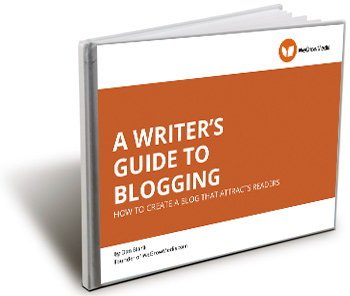
Thanks for the suggestions for writing! I’ve incorporated video, and will be including just audio soon as well.
I loved the onion clip by the way! That’s how I feel with 74 followers 🙂
http://forthisisthetime.blogspot.com
Ha! Thanks Esther!
I’ve been a little discouraged about blogging lately so this is very timely for me. Thank you!
Thanks Cheryl! I think a lot of people feel that way. Partly because there is so much hype around everything else. Also because: blogging is difficult!
🙂
-Dan
Thanks for the post, Dan! I love what you said about you control the message & develop a body of work over time. This is so true!
One concern I have about social media is we never know how it may change or falter over time. If we put all of our energy into a specific social media outlet and the website somehow ceases, writers have no control over lost content. This is why I am a big believer in blogging and treat my blog as my virtual “home.”
Thank you Christy. Well, the key with social media is to not develop a relationship with the service provider (EG: Twitter, Facebook), but with the people you connect with. Those relationships should move wherever you go online or off! I agree with you about establishing a firm home online.
Thanks!
-Dan
This is so helpful, Jane. Love the considerations for “keep the fire burning”…Thank you!
Thank Dan. 🙂
Thanks!
This is good advice. Even as a new blogger this is good to keep in mind to help focus my blog in a way to try and avoid this exhaustion in the distant future. Great article!
Glad it helped – thank YOU!
-Dan
I like the ‘Body of Work’ mindset here, for my blog is ever-evolving. For instance, when I first began Biddy Bytes, it was with a selfish reason. I needed to focus myself on the positive in life, so I could get through the daunting problem of my husband’s “death experience” (oh, be assured–he recovered, but it was a long route back.) But I discovered, since my theme was ‘encouragement in a difficult world,’ I appeared in Google search, lumped together with all the religious sites. Now, unless one is Joel Osteen, that’s not necessarily a good thing. So, lately I have focused on a more niche market…My straddling two worlds (at least.) But I no longer fear my blog’s being lost in the stratosphere of writers…I am looking for my niche audience. I am looking for my pure identity…And just as in life, I am ever-developing over the years, so my blog reflects that, too. It’s not a constant; it’s ever-static…changing…evolving…Just like me–its owner.
Colleen,
Thank you – I really like how you align blogging to living: it’s a journey! And that means it changes constantly.
-Dan
Great article and completely affirms where my thinking has gone with my blog this year. I have bucked some of the trends of “blog hops” and writing about, well, writing. I’ve tried to find my own words and heart and found that although my readership has somewhat leveled out, my most popular posts with the most thoughtful responses are my more personal articles. I’ve also found I enjoy the process much more now than trying to fit a mold that’s already out there.
Julie,
Thanks for sharing this. Blogging is so much about voice, and how we measure the true value of what a blog creates is rarely represented in “page views.”
-Dan
Dan, as usual, offers wise and helpful counsel. As I get closer to book publication, I want to follow the advice of mapping out a long-term strategy and subjects for blog posts. I also want to create a schedule. Structure is one of the keys to motivation for me. Thanks, Jane, for introducing me to Dan’s work. I recommend it to others.
Hi, Shirley. A fellow Mennonite here. Of course, like any good Mennonite, I recognized your name immediately. The reason you may not recognize mine is that I did not grow up Mennonite. I became one as an adult by choice. I joined Kern Road MC as an adult. I did quite a bit of writing for Mennonite Board of Missions / Mission Network several years ago. Best of luck on your upcoming book!
Hi, Ann. Always fun to find a new kindred spirit in blog comments! I decided to follow you on Disqus. Not sure what that means. But hey. Do you have a website? I’ll come visit and also invite you to mine.
Oh, thank you Shirley!
Wonderful article, Dan, and I agree with all of your points–particularly the body of work aspect. But one of the reasons I enjoy blogging is in order to figure myself out. I’m learning as much about myself as my followers. It’s like the Flannery O’Connor quote:
“I write because I don’t know what I think until I read what I say.”
Vaughn,
Love that! yes, so much of blogging is about process, identity and exploration. Much appreciated.
-Dan
i very much agree with this, Vaughn
Excellent piece with lots of great tips and words of wisdom. You’ve hit on all the reasons why I continue to write consistently, if not daily, on a blog. Social media are great for helping to promote one’s blog, and it’s a good idea to keep current as new ones develop in order to use them most effectively. But for all the reasons you articulate here, blogging is still a good discipline for writers to preserve. Thanks for the good words, Dan. And Jane, thanks for inviting him to write a guest blog on your site.
Thanks Ann! To me, social media is so much about the day-to-day engagement with others, and giving to the relationships we forge. But blogging allows you to craft content in all it’s forms, and really gives it a home. Thank you so much for the comment.
-Dan